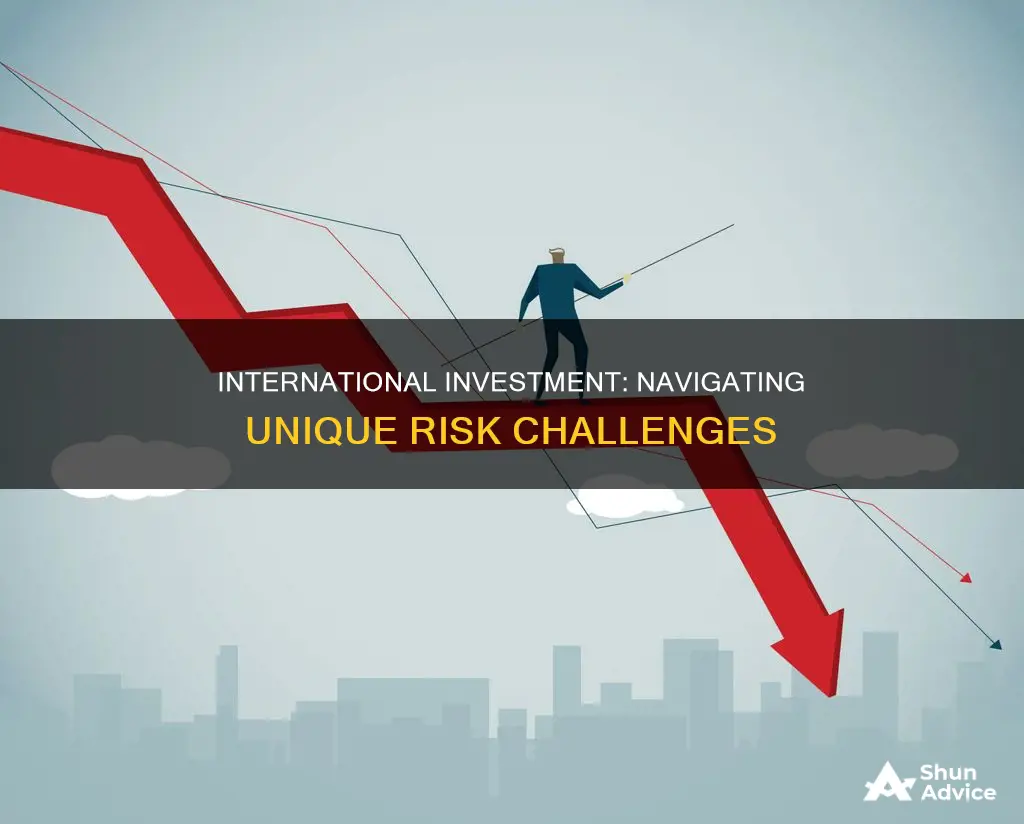
International investing can be a risky business. There are a number of factors that can increase the risk of investing in foreign markets, including higher transaction costs, currency volatility, and liquidity issues. These risks are heightened when investing in emerging markets, which may have lower trading volumes and fewer listed companies. Political, economic, and social events can also be difficult to predict and can have a significant impact on investment returns. Country risk, which includes factors such as political stability, economic strength, and sovereign default risk, can also affect the outcome of international investments.
What You'll Learn

Higher transaction costs
Transaction costs are often significantly higher for international investments when compared to investing in domestic markets. This is the biggest barrier to investing in international markets. While we live in a globalized and connected world, transaction costs can vary greatly depending on the foreign market being invested in.
Brokerage Commissions
Brokerage commissions in international markets are almost always higher than U.S. rates. For example, a U.S. investor purchasing a single stock in Hong Kong would pay around $38.28 in fees per trade, based on the exchange rate on July 20, 2023.
Additional Charges
On top of higher brokerage commissions, there can be additional charges specific to the local market, such as stamp duties, levies, taxes, clearing fees, and exchange fees.
Fund Manager Fees
Investing through a fund manager or professional manager will also be more expensive than usual due to the significant time and money spent on research and analysis. This includes hiring analysts and researchers familiar with the market, as well as professionals with expertise in foreign financial statements, data collection, and administrative services.
Mitigating Higher Transaction Costs
One way to minimize transaction costs on international stocks is by investing in American Depositary Receipts (ADRs). These are negotiable financial instruments issued by U.S. banks that represent a foreign company's stock but trade as a U.S. stock, eliminating foreign exchange fees. However, investors in ADRs are still vulnerable to currency price fluctuations.
The Investment Management Industry: Size and Scope Explored
You may want to see also

Currency volatility
To mitigate currency risk, financial professionals often suggest hedging currency exposure using tools like currency futures, options, and forwards. However, these strategies may be too complex for individual investors. A more user-friendly alternative is the currency exchange-traded fund (ETF), which offers good liquidity, accessibility, and straightforward implementation.
Another aspect of currency volatility is the risk of foreign currency controls imposed by some countries. These regulations can restrict or delay investors or companies from moving currency out of a country, impacting the ability to repatriate investment returns. Therefore, investors need to be aware of the potential for such controls when considering international investments.
In summary, currency volatility is a critical factor for international investors to consider due to its potential impact on investment returns. While there are strategies to mitigate currency risk, such as hedging and using ADRs, it remains a complex and uncertain aspect of international investing that can scare off many investors.
High-Risk Investments: Worth the Gamble?
You may want to see also

Liquidity risk
Firstly, markets outside the US may have lower trading volumes and fewer listed companies, resulting in reduced liquidity. Additionally, some countries impose restrictions on the amount or type of stocks that foreign investors can purchase, further impacting liquidity. Political and economic crises in these countries can also lead to sudden liquidity issues, as investors may be unable to sell their investments quickly without substantial losses.
The impact of liquidity risk can be severe, leading to financial losses, operational disruptions, and reputational damage. In extreme cases, it can even drive entities towards insolvency or bankruptcy. Therefore, effective liquidity risk management is crucial. This includes maintaining a portfolio of liquid assets, employing rigorous cash flow forecasting, and diversifying funding sources.
To summarise, liquidity risk is a significant consideration for international investors, especially in emerging markets. It can hinder an investor's ability to meet their financial obligations and may result in substantial losses. By understanding the dynamics of market and funding liquidity risks, investors can implement effective risk management strategies to mitigate potential challenges.
Investing in Chaos: Strategies for Uncertain Times
You may want to see also

Political, economic, and social events
Political Factors
Political stability is crucial for investment decisions. Unfavourable political decisions can lead to unexpected losses for investors. For instance, a country's political climate might become less welcoming to foreign investors, or policies might be enacted that hinder investment opportunities. Political risks also encompass the potential for civil wars, mass protests, and other significant events that can disrupt economic activities and impact investment outcomes.
Economic Factors
Economic considerations play a pivotal role in international investment decisions. A country's ability to repay its debts and the stability of its finances are essential factors. Countries with stronger economies and sound financial management tend to present more reliable investment opportunities. Economic factors also include the potential for dramatic changes in market value and liquidity risks, especially in emerging markets.
Social Factors
Social events, such as shifts in public sentiment or demographic changes, can influence investment prospects. For example, consumer behaviour and demand can be influenced by social trends, impacting the performance of investments. Additionally, social risks, such as labour issues or social unrest, can affect the stability of a country and, consequently, the attractiveness of investment opportunities.
Country Risk Analysis
Country risk analysis is a fundamental step in international investment decision-making. It involves evaluating the economic, political, and business risks unique to a specific country. This analysis helps identify potential risks, including political, economic, and sovereign default risks. Country credit ratings, economic indicators like GDP and CPI, and independent risk reports are valuable tools for assessing these risks.
Impact of Chinese Investment
In recent years, the increasing investment activity from China, particularly in industrial and technology sectors, has led to heightened scrutiny from Western countries. The acquisition of critical technologies and supply chains by Chinese companies has raised national security concerns, resulting in expanded oversight and stricter regulations. This dynamic has significantly shaped the international investment landscape.
Foreign Direct Investment: Boon or Bane for India?
You may want to see also

Legal remedies
The Securities and Exchange Commission (SEC) offers four mechanisms to protect investors: investment legislation, investment contracts, bilateral investment treaties, and multilateral investment treaties.
US investors should ensure that any broker or investment advisor they work with is registered with the SEC or the appropriate state regulatory entity. It is generally against the law for a broker, foreign or domestic, to contact a US investor and solicit an investment unless the broker is registered with the SEC. If US investors directly contact and work with a foreign broker not registered with the SEC, they may not have the same protections as they would if the broker were subject to US laws. Investment advisors advising US persons on investments in securities must register in the US or be eligible for an exemption to registration.
In addition to the SEC, the Committee on Foreign Investment in the United States (CFIUS) is a government body with the power to block foreign investments in US companies. CFIUS screens foreign transactions with US firms for potential security risks and can recommend that the president block a transaction on "national security" grounds.
What is Invested Capital? Equity or Asset?
You may want to see also







